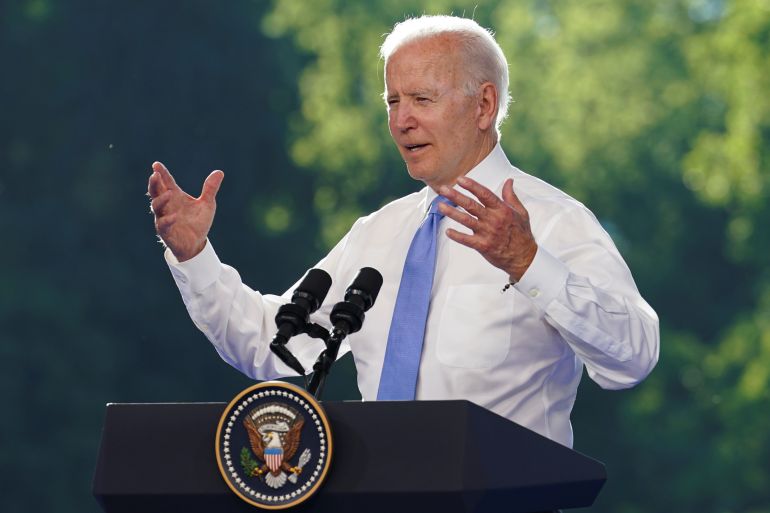US, Russia to enter ‘strategic stability’ dialogue: Biden
Human rights, nuclear weapons control, de-escalating conflicts in Syria, Afghanistan, Iran and Ukraine top Biden agenda.

United States President Joe Biden and his Russian counterpart Vladimir Putin have agreed to engage in a bilateral dialogue on “strategic stability” aimed at reducing the risks of unintentional conflict and restrain nuclear weapons, Biden said in a news conference in Geneva on Wednesday.
Speaking after a three-hour series of meetings, Biden said he urged Putin to respect human rights and political freedoms in Russia and asked him to reopen humanitarian corridors in Syria to allow delivery of food and cooperate in preventing Iran from acquiring nuclear weapons.
Keep reading
list of 4 itemsDisagreements, low expectations as Biden, Putin meet in Geneva
What will come from the Biden-Putin summit?
Biden, Putin agree to talks on arms control, cybersecurity
Biden said he had expressed an “unwavering commitment to the sovereignty and territorial integrity of Ukraine” and discussed the US and Russia’s shared interest in preventing “a resurgence of terrorism in Afghanistan”.
He also stressed to Putin the importance to the American people of respect for “human rights” and US concern about the arrest of opposition political figure Alexey Navalny.
“I told President Putin that we need to have some basic rules of the road that we all abide by,” Biden said.
“I also said there are areas where there’s a mutual interest for us to cooperate for our people, Russian and American people, but also for the benefit of the world and the security of the world,” Biden said, adding that there is “more work to do” and the next six months to a year would show whether the US and Russia can engage in more cooperative relations.
The US and Russian presidents agreed to resume arms control talks and to return ambassadors to each other’s capitals after they were withdrawn earlier this year.
Biden and Russian President Vladimir Putin met for about three hours at their first summit on Wednesday, less time than Biden’s advisers had expected, the Reuters news service reported.
Prior to the meeting in Geneva, White House officials had outlined three broad objectives for the summit with Putin.
First, they hoped to find clear areas where the two nations can work together to make the world safer and the summit yielded an agreement by Putin to engage in talks aimed at limiting nuclear weapons.
Biden planned to convey to Putin a clear statement of US national interests on key issues and warn that Russian actions counter to those interests would be met with a US response. On the Russian side, Putin was looking for a shift in tone from Washington.
Responding to questions from the American media, Biden argued Russia would be viewed more favourably by other nations for investment and trade if Moscow respected political rights at home and operated within international norms. And Biden offered some details of their back-and-forth conversation.
Putin had pressed Biden on whether the US will be able to maintain security and stability in Afghanistan after US and NATO troops withdraw. Biden said he responded that would depend in party on Russia’s actions and Putin offered to help.
Putin also pressed Biden on why the US continues to oppose the government of Bashar al-Assad in Syria. Biden said he tied US policy to Assad’s alleged use of chemical weapons.
Biden mostly avoided contradicting Putin on hot-button issues of cyberattacks and Russia’s interference in US elections and stopped short of expressing confidence the summit would yield a change in Russian conduct.
“There’s a genuine prospect to significantly improve relations between our two countries without giving up a single solitary thing based on principle, and our values,” Biden said.
In a separate post-meeting news conference, Putin described the dialogue with his US counterpart as pragmatic and without hostility. It showed the leaders’ desire to understand each other, said Putin, who added he saw Biden as “experienced” and “balanced”.

Putin said Russia and the US shared the responsibility for nuclear stability, and would hold talks on possible changes to their recently extended New START arms limitation treaty that was renewed in January for another five years.
“If you look at the very big picture, the strategic discussions moving on from New START – the nuclear policy regarding these two major nuclear powers – clearly we should all be a little relieved that they are talking about that, potentially going to talk further on that,” said Al Jazeera diplomatic editor James Bays.
The Russian president dismissed Washington’s concerns about the arrest of opposition political figure Alexey Navalny, Russia’s military presence in eastern Ukraine, and US allegations that Russian hackers were responsible for a series of cyberattacks in the US.
Diplomatic relations between Moscow and Washington deteriorated in March when Biden said he thought Putin was a “killer“, prompting Russia to recall its ambassador to Washington for consultations. The US recalled its ambassador from Moscow in April.
Putin, who warned two weeks ago he thinks the US is trying to hold Russia back, said on Wednesday he was satisfied by Biden’s explanation of the remark.
“Clearly President Biden wanted to strike a tone of being willing to try to work together if Putin is willing to try to work together and to de-escalate tensions, as the Biden administration has said repeatedly, to try to create a more stable and predictable relationship,” former US ambassador to NATO, Kurt Volker, told Al Jazeera.